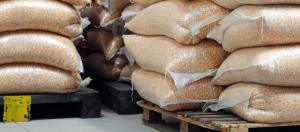Handling and storing horse feed during the hot and muggy summer months can be a challenge. The equine nutritionists at Kentucky Equine Research (KER) offer the following tips:
Store your feed in a cool, dry, and well-ventilated place. If there is a window in the feed room, you might consider putting in a window air-conditioner just for the summer months. If the feed room does not have a window but has a door that shuts tightly, consider running a dehumidifier to remove moisture from the air. Using a closed bin for the feed is fine if it is in a cool place.
Do not buy any more feed than you can use up in 10 to 14 days. Avoid taking advantage of summer specials that give a free bag if you buy a certain quantity (e.g., buy 10 bags and get one free). This is not a bargain if you lose several bags to spoilage. Protect feed from direct sunlight.
Allowing air to circulate around the bags will help to avoid a buildup of internal heat. Never set bags directly on the floor, especially if it is concrete, as the bag will wick moisture and spoil the feed. Pallets are ideal because they get the bags high enough off the floor to let air circulate underneath them. If possible, set the bags up on end and slightly apart to allow the air to circulate all the way around (top, bottom, and sides). In areas with a lot of heat and humidity, the bags should not be stacked more than four high. Leave space between the stacks for air circulation.
Allow any heat within the bags to be released by “jouncing” the bags. This will also help avoid clumping in the feed. Remove shrink wrap from any bag because this covering will restrict the bags from breathing. Similarly, avoid storing feed in plastic bins because this too will limit air movement. Galvanized steel bins have a tendency to sweat on the inside if they hold a high-moisture feed. If containers are used, be sure to clean out any remains of older feed before adding new feed to a container. Avoid storing feed in bulk bins in the summer.
Many feeds, including all those formulated by KER, contain sufficient mold inhibitor and antioxidants for protection during the summer months. However, with some off-brand feeds, summer heat and humidity can cause spoilage in stored products. In general, pelleted feeds keep longer than textured (sweet) feeds. The molasses in sweet feeds may become spoiled, and pelleted feeds can mold. High-fat feeds will develop a rancid odor fairly rapidly in the heat and must be used up quickly.
Horses have a very sensitive sense of smell. If you can smell that something is going bad, you can be sure that your horse can, too. It is a good idea to check any feed before offering it to your horse. If the horse will not eat it, get rid of it.
If your horse has eaten spoiled feed, you may see signs like diarrhea or a loss of appetite. Most importantly, watch for indications of colic, e.g., horse looking at its flanks or kicking at its belly, patchy sweating, lying down and getting up repeatedly. Call your veterinarian if the horse seems uncomfortable.






